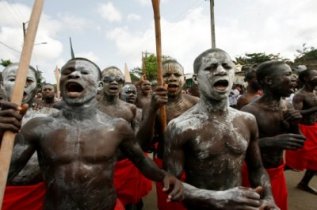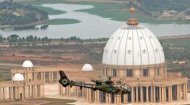|
A series of coups and a devastating civil war erupted in 2002, dividing the country along North-South lines and significantly impacting its social fabric and economic stability. A second, shorter but equally violent post-electoral crisis followed in 2010-2011. The nation has since embarked on a path of reconciliation and reconstruction, largely stabilising its political environment and recommitting to democratic principles. This period of resilience highlights the Ivorian people's determination to overcome adversity and rebuild their nation. Ivory Coast's social profile is characterised by its ethnic and linguistic diversity. Over 60 distinct ethnic groups coexist, each with its own customs, traditions, and dialects, though French remains the official language and a unifying medium. Islam and Christianity are the dominant religions, often practised alongside traditional animist beliefs, fostering a unique blend of spiritual expression. This diversity is reflected vividly in the country's rich cultural output. Ivorian art, particularly its masks, sculptures, and textiles, is globally renowned for its intricate craftsmanship and symbolic depth. Music is another vibrant aspect of Ivorian culture, with genres ranging from traditional drumming and storytelling to modern coupé-décalé, zouglou, and reggae, which resonate across the continent and beyond. Cuisine, too, is diverse and flavorful, with staples like attiéké (cassava couscous), alloco (fried plantains), and a variety of spicy sauces accompanying grilled fish or meat.
The economic backbone of Ivory Coast is undeniably its agricultural sector, which makes it the world’s largest producer of cocoa beans. Cocoa accounts for a significant portion of its GDP and export earnings, supporting millions of farmers. Coffee, rubber, palm oil, cotton, and cashew nuts are other vital agricultural commodities. This strong agricultural base has historically made Ivory Coast a regional economic powerhouse. Beyond agriculture, the Ivorian economic profile is diversifying. The country possesses significant untapped mineral resources, including gold, diamonds, and manganese, leading to growing interest in the mining sector. Explorations for oil and natural gas have also yielded promising results, contributing to energy independence and export revenue. The manufacturing sector, though still nascent, is gradually expanding, particularly in food processing and textiles. Following years of political instability, Ivory Coast has experienced impressive economic growth, averaging over 7% annually in the past decade. This resurgence is driven by government investments in infrastructure (roads, ports, energy), reforms aimed at improving the business climate, and increased foreign direct investment. Abidjan serves as a major regional hub for finance, trade, and logistics, boasting modern port facilities and a burgeoning services sector. Despite this growth, the distribution of wealth remains a key challenge, with efforts ongoing to promote inclusive development and reduce poverty, especially in rural areas. Despite its progress, Ivory Coast continues to face a range of challenges that impact its development trajectory and the daily life of its citizens. Socio-political divisions, though significantly healed, occasionally resurface, requiring constant vigilance and commitment to national reconciliation. Economic inequality remains pronounced, with the benefits of growth not always reaching the rural poor or marginalized urban populations. This disparity can fuel social grievances and hinder long-term stability. Infrastructure gaps persist, particularly outside major urban centres, affecting access to essential services like electricity, clean water, and reliable transportation. Climate change poses a growing threat, with deforestation impacting agricultural productivity and increasing the vulnerability of communities to extreme weather events. Environmental degradation, particularly from unsustainable farming practices and rapid urbanisation, demands urgent attention. Youth unemployment is another critical concern, leading to social frustrations and sometimes contributing to informal economic activities. Governance issues, including the need for continued efforts to combat corruption and strengthen institutions, also present hurdles. Addressing these challenges requires sustained government commitment, robust civil society engagement, and continuous international partnership to ensure inclusive and sustainable development. |
Ivory Coast Profile |
Ivory Coast Profile |
Ivory Coast Profile | Ivory Coast Profile |

|
The rhythm of daily life in Ivory Coast is a vibrant blend of tradition and modernity. In urban centres like Abidjan, the day begins early, with streets filling with commuters heading to offices, markets, or schools. Traffic, known as "bouchons," is a common feature, navigated by a mix of private cars, taxis, and the ubiquitous "gbakas" (shared minibuses) and "woro-woro" (shared taxis). The markets, such as the famous Marché de Cocody, are bustling hubs of activity, offering everything from fresh produce and exotic spices to textiles and handcrafted goods. Food plays a central role in Ivorian culture. Meals are often communal affairs, with families gathering to share dishes like "foutou" (pounded plantain or yam) with "sauce graine" (palm nut sauce), or grilled fish with attiéké. Hospitality is deeply ingrained, and visitors are often welcomed with warmth and generosity. Evenings in the cities come alive with music, street food vendors, and social gatherings, reflecting the nation's energetic spirit. In rural areas, life is more agricultural and community-focused. Days revolve around farming tasks, family responsibilities, and village activities. Traditional customs and oral histories are often passed down through generations, maintaining a strong link to cultural heritage. Despite economic disparities, a strong sense of community support and resilience characterises Ivorian daily life, demonstrating the enduring strength of social bonds. For those eager to explore, Ivory Coast offers a diverse array of tourist attractions that showcase its history, culture, and natural beauty: Abidjan: The economic capital is a dynamic metropolis often called the "Manhattan of West Africa." Visitors can explore the Plateau district with its modern skyline, visit the iconic St. Paul's Cathedral, experience the vibrant atmosphere of its numerous markets, or relax at the serene Jardin Botanique de Bingerville. Its lagoons also offer opportunities for boat trips. Today, Ivory Coast, with its population of 32.7m, is ranked in 157th place out of 193 countries and territories in 2025 in terms of life expectancy, literacy, access to knowledge and the living standards of a country.
|

 Education and healthcare remain crucial areas of focus. While significant strides have been made in increasing school enrollment and improving health infrastructure, disparities persist, particularly between urban and rural areas. Community life plays a vital role, often centred around family, religious institutions, and local markets, where social interactions and cultural exchanges thrive. Despite past divisions, there's a strong underlying sense of shared Ivorian identity that continues to evolve and strengthen.
Education and healthcare remain crucial areas of focus. While significant strides have been made in increasing school enrollment and improving health infrastructure, disparities persist, particularly between urban and rural areas. Community life plays a vital role, often centred around family, religious institutions, and local markets, where social interactions and cultural exchanges thrive. Despite past divisions, there's a strong underlying sense of shared Ivorian identity that continues to evolve and strengthen.








